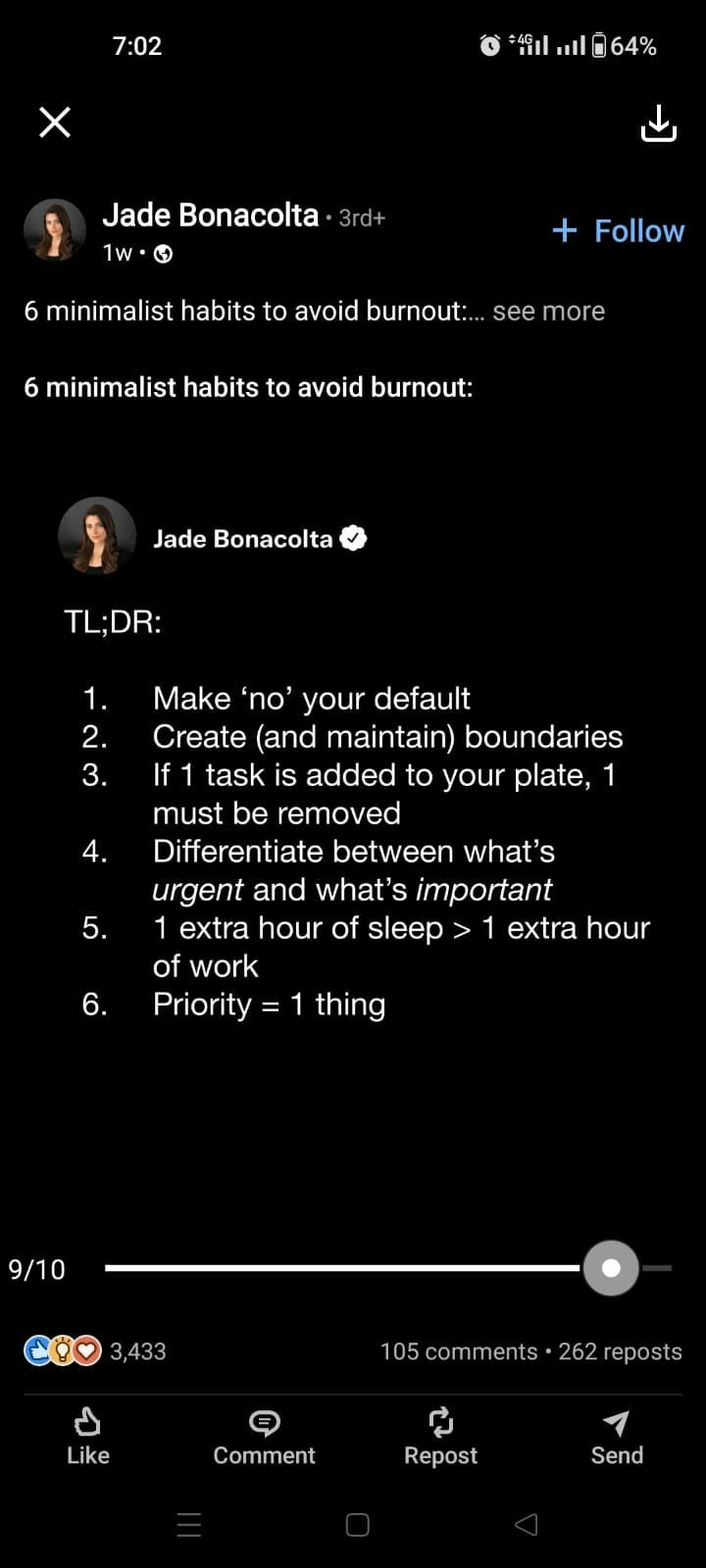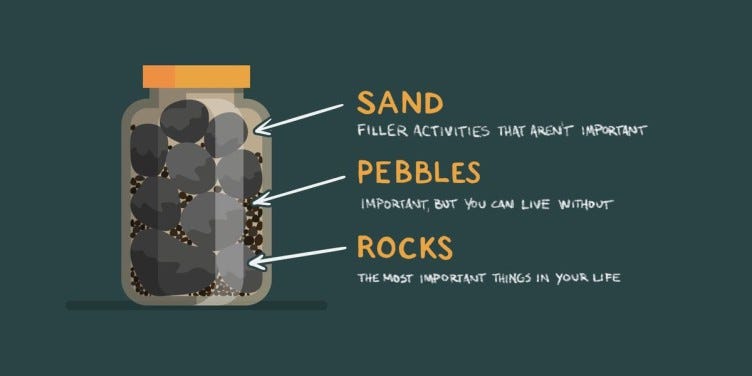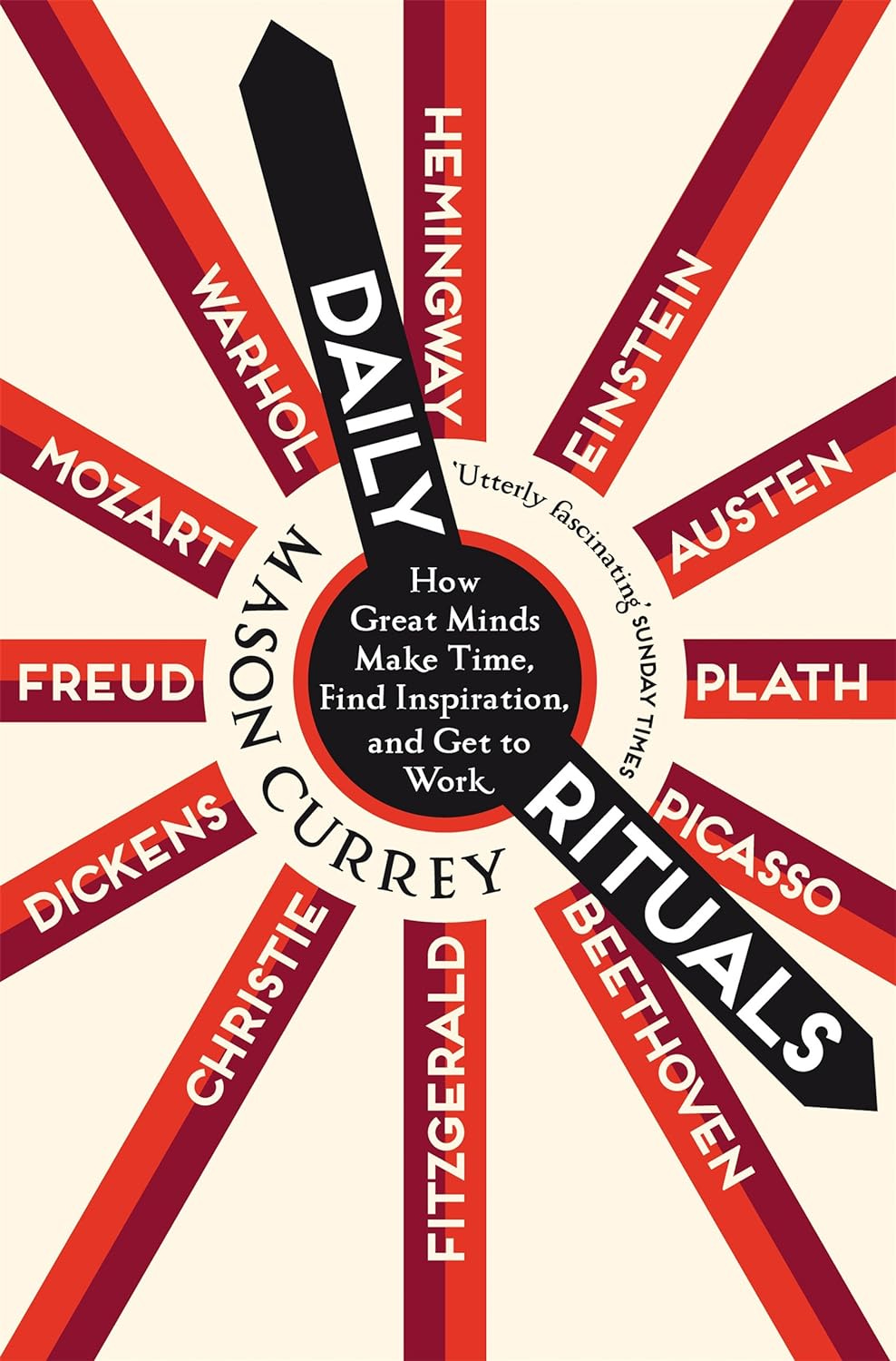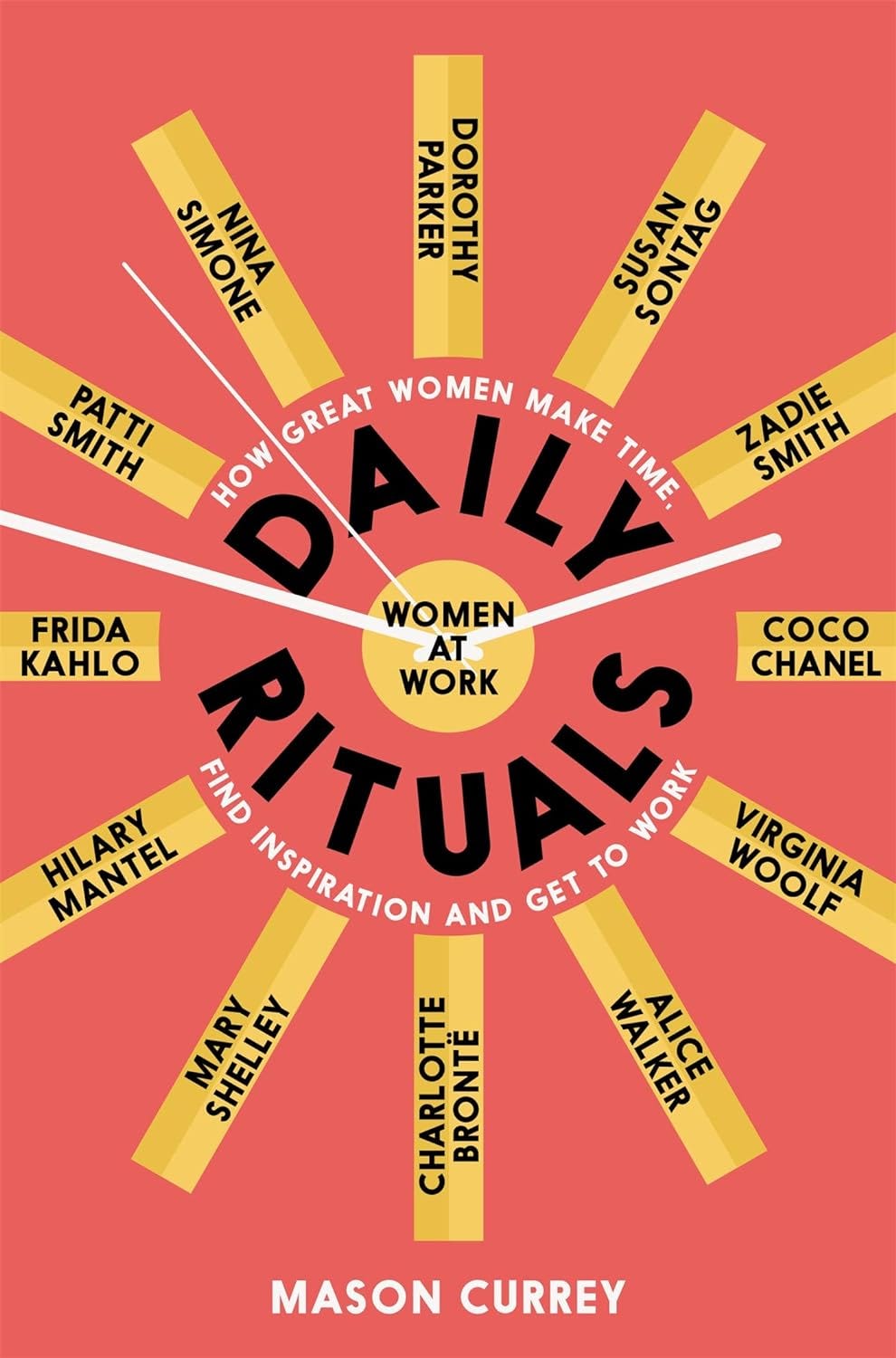Why productivity hacks do not work for women
Issue #106: Our definition of 'productivity' has a teenyweeny blind spot - half the world
Heads up: This post has many hyperlinks. You will feel like you HAVE TO click them, buy them, read them - right away. But I urge you to please finish reading the post and then scroll back up to click away if you still feel like it. I promise you what follows is worth the wait.
Hello ji,
I am a woman of many vices. One of them is my addiction to what is called ‘productivity porn’. You know what I mean…
8 ways to manage your time better!
12 parts of an effective morning routine!
373 hacks to stop procrastinating NOW!
One of my favorite productivity people out there is Ali Abdaal. Actually, with nearly five million YouTube subscribers, he is the internet’s favorite productivity person. And for good reason too. His videos have a clear message, are very well-produced, and he comes across as a really genuine person who truly believes in the work he is doing.
I want to talk about one of his most recent videos here which particularly blew my mind. It is titled “I Tried 137 Productivity Tools. These Are The Best”. (Reminder to RNCL: Read now. Click later.)
In the video, Ali takes us through a typical day in his life, and all the tools that he uses regularly to keep it productive:
His mornings begin with weighing himself on his ‘Withings smart scale’, which syncs with his Apple Healthkit app.
Then he makes freshly brewed filter coffee with an appliance called ‘The Clever Dripper’.
Then he writes at least three pages in a ‘leuchtturm1917 journal’ to unclog his brain and prepare for the day.
Next, he opens the ‘Things 3’ app on his iPhone on which he goes through two lists - his ‘to-do list’ and his ‘today list’. The app, of course, syncs automatically with his Google calendar so he has a good idea of what each day has in store for him.
He then puts his journal and iPad in a ‘Peak Design Everyday Sling’ bag and proceeds to a local coffee shop to write, because he finds that a change of location helps improve his productivity.
He writes on the app Ulysses, which syncs to various other apps - Notion for work stuff, Google Drive for his book stuff, and Convert for emails.
If this is getting overwhelming for you, I would like to point out that we are just 4 minutes into a 19-minute video right now.
The productivity tools coming up ahead in the video include a ‘zero inbox’ app for emails, a treadmill desk, a dual-screen monitor setup to play ambient focus music while he works, a Mac computer for work, and a Windows PC for gaming.
Ali even has a separate app to read bookmarked articles on his phone when he goes to the toilet.
I want to emphasize that I have simply typed out the exact things Ali says in the video, and none of this is embellished for effect, sarcasm, or humour. (Yes, that is my usual tone in this newsletter, but not right now - at least not yet.)
In fact, I genuinely respect and admire Ali for his discipline and dedication, and will be among the first to buy his book once it comes out.
That said…
I am now a full-time writer, podcaster, and YouTuber too. This is not to say that Ali and I are the same - he is far far ahead in every possible aspect.
I am merely stating the fact that we are in the same profession.
Now, here is how my typical morning goes:
I wake up with one mission on my mind - get my kid to school.
This mission might seem simple enough, but with a toddler, there are more variables than you can imagine.
What will be his mood when he wakes up? Will he gently open his eyes, and give me a smile that lights up my world? Or will he bawl his eyes out, and accidentally kick me in the neck when I try to comfort him?
What song and dance routine will I have to put up today to get him to see brushing his teeth as a desirable activity?
Will my cook come on time and prepare his breakfast and dabba with no hiccups? Or will she surprise me with the gift every woman dreads - a last-minute leave?
Will the school be open as planned or will the State government issue a last-minute circular announcing a bombshell public holiday again because of some unfathomable lunar calendar calculus?
My son is still new to the school-thing, so I do not know if, at the school gate, he will wave me an absent-minded goodbye and walk away. Or will there be tears?
If tears, will they be manageable ones that he can be reasoned out of, or distracted from?
Or will it be an epic meltdown that ends in me having to take him back home, because today is just not our day? It happens, trust me.
On the miraculous day that all goes ‘as planned’, I get three hours when my son is away at school. During this time, I need to get dressed, shovel in some breakfast, maybe have a coffee if I remember to, manage all the pressing demands of the house, and hopefully, work.
In his incredibly successful book, ‘Deep Work’ (RNCL) Cal Newport defines deep work as ‘professional activities performed in a state of distraction-free concentration that push your cognitive capabilities to their limit’.
It is a fantastic idea, and - on the few occasions I have had the privilege to achieve a state of deep work - I have definitely seen the merit in it.
But here is my reality - in these three hours, I also have to do household chores, errands, couriers, plumbers, carpenters, electricians (we have recently moved into a beautiful but ancient government house and I do not recall a single day so far when nothing needed repair), grocery shopping, and various other forms of physical and mental load.
I feel lucky on the days that even one out of my three hours of ‘solitude’ is actually focused entirely on my official ‘work’. And it is never ‘deep work’ as Newport defines it because most of the above activities are not in my control to schedule as per my calendar.
Which brings us to roughly the point where we left Ali Abdaal in his day.
Notice the smidge of a difference in our mornings?
On the midnight hunt for toothpicks and playdough
Preeti is an entrepreneur who runs her business across several countries. She has heard many productivity hacks from her peers and mentors over the years.
“Productivity Bros have taken over the internet, and they are getting more bizarre every day in their quest to ‘optimize’ life. Because having every moment of every day optimized was not a worthy enough goal, they are now officially in pursuit of immortality like the gentleman below, who was featured in the this excerpt from TIME magazine:
Bryan Johnson, the centimillionaire tech entrepreneur who wants to live forever, walked TIME's Charlotte Alter through his morning routine, step-by-step… His bedroom had almost nothing in it: no photos, no books, no television, no glass of water, no phone charger, no chair with piled-up clothes he tried on once, no dry cleaning he meant to put away, no towels, no mirror, no nothing. “I only sleep in here,” he said. “No work, no reading.”
The only two objects in the room besides his bed were a laser face-shield he uses for collagen growth and wrinkle reduction, and the device he wears on his penis while he sleeps to measure his nighttime erections.
“I have, on average, two hours and 12 minutes each night of erection of a certain quality,” he said. “To be age 18, it would be three hours and 30 minutes.” Nighttime erections, he said, are “a biological age marker for your sexual function,” one that also has implications for cardiovascular fitness. The erection tracker resembled a little AirPods case with a turquoise strap, like a purse worn by a penis.”
‘But they are not all penis-purse-wearing nutjobs’, I hear you say.
Preeti agrees. She says that there is a lot of very good advice on the internet. The only problem is that it seems to forget that half the world’s population has a lot less privilege than the other half when it comes to managing their own time.
“They say, ‘Focus on deep work’. They say ‘Avoid multitasking’. They say ‘Keep your phone away to eliminate all distractions’.
When I say ‘they’, I mean ‘men’.
Here is an example of what happens when a woman tries these mantras:
I had a lot on my plate at work today, so I thought I will try the deep work philosphy to focus better. I kept my phone away to ‘eliminate distractions’, as advised. I only checked my messages at 9 pm after my (extremely productive) workday was done.
The first thing I noticed were the hundreds of messages on my kid’s school WhatsApp group.
Turns out, they are doing a craft project tomorrow, for which they want us to send kids with toothpicks, play-dough, a small ruler, a pair of dice, and a bunch of other things. ‘Just things lying at home’, the school said, ‘No need to stress!’
But I did not have most of these things lying around my home! So - in the middle of a city going mad with Ganpati celebrations - I was suddenly out on the street, driving through traffic in the middle of the night, on the hunt for toothpicks and playdough.”
“So, no thank you, O Hallowed Gurus of Productivity - I will not be putting my phone away or turning off notifications again anytime soon, no matter how productive it makes my workday.
What if my kid’s school suddenly wants me to send a live giant panda to school with him tomorrow? I would at least like a headstart so I can get one before all the good Pandas are gone, because I was too busy working deeply.”
On Revenge Bedtime Procrastination. And potty time.
Samantha is fascinated by this post (RNCL) from the productivity author and speaker, Ankur Warikoo, in which he describes his typical day.
“Warikoo wakes up at 4.30am and sips water while doing nothing for 20 minutes. Then 10mins of checking WhatsApp and emails, and half an hour of meditation. Then half an hour of singing practice, followed by half an hour of reading. For the next 15mins, in his own words, ‘it is potty time’. Then an hour of workout. 15mins of yoga. 15mins of reading the newspaper. 30mins to get ready. 45mins for breakfast. And then his workday begins.”
Again, I admire the discipline and dedication Ankur clearly shows in following this schedule. If you read the thread, each activity is also well-thought-out and well-researched, with apps and sources to boot. (RNCL)
But let us take the smallest, cutest, most relatable part of his morning routine. He takes 15mins for ‘potty time’.
Here is how most moms I know spend their potty time:
Have you ever tried pooping with someone constantly shouting for you and knocking/banging on the door? Even if we did have the luxury to take more time - which we don’t - there is literally no incentive to stretch this experience beyond the absolute bare minimum time the human body needs.
Of course, the internet overfloweth with memes about how much time husbands spend on their porcelain throne.
Anyway, sorry I got distracted by Ankur’s potty time.
Samantha has far more polite thoughts about the rest of his morning routine.
“This crazy schedule - I am simply unable to understand how he can be doing all this. Meanwhile, I feel like I am always, always playing catch-up.
Educated, financially independent women like us are so privileged. And yet I can never imagine living like that!
I am a highly productive individual myself. But as soon as I wake up, I have to help my kid get ready, without any help from anyone. From the moment I wake up to the moment I drop him at the school bus stop, I don’t have the time or space to even begin to think about my own ‘productivity’.
Between the school and the nanny - I manage to get some work done in the day.
But if either one of these two support systems is absent, my day is practically shot. And we all know how often kids fall ill and can't go to school, or schools have holidays, or domestic help can take unforeseen leaves. Such days are a jumble of the kid's chores, making sure he doesn't disturb my calls, doing work while keeping him somewhat engaged, taking care of his basic needs like food, bath, etc.”
“Second, all the demands on my time from his school. They keep calling us for some or the other ‘Orientation’. Or there is homework that cannot be done without the parent’s help. And all of this falls on the moms. I have even heard of schools that refuse to contact Dads despite specific instructions to do so.”
“And then there is the work that is invisible to most men and, therefore, takes up more than half the life of their wives. Planning meals, ordering or buying groceries, managing laundry, keeping an eye on when the kitchen or cleaning supplies are running out, when the kids need new clothes, shoes, books, and researching and buying the best quality things our family can afford. These are things that no hired help can do and fall solely on women in most ‘modern families’ even today.
Of course, none of this features in the daily routine of any Productivity Bro.”
Finally, the last item on Samatha’s to-do list - and absent on most women’s lists - is her me-time.
“This probably makes me a ‘bad mom’ or an ‘unproductive worker’ in some people’s eyes, but I also want some time to read, to relax and unwind at the end of the day.
Every night, I spend an hour putting my kid to sleep. After that, I take this me-time for my own mental health and sanity. So waking up at 4.30am to workout and meditate is not a privilege I enjoy.”
Samantha’s day does not remotely match any Productivity Guru’s. But she is still somehow fitting more in it than can be humanly managed in 24 hours. The thing she sacrifices to squeeze it all in? Her sleep.
“My body does not know anymore what getting good sleep feels like. I recognize that this is also because I make the choice to prioritize my me-time, and spend some non-parenting time by myself and with my husband. But the ultimate result is that I have no idea what it feels like to inhabit a human body that has had 8 hours of sleep.”
I edited this piece down to reduce the number, but still - I want the reader to notice how many times Samantha justifies her need for me-time in this story. This, even as every male Guru out there proudly talks about how large chunks of his day – his workout, his meditation, his reading – is his me-time.
This guilt that all women - especially mothers - feel for carving out even a few minutes a day for themselves, is the reason why women (including me) consume most productivity gyaan (wisdom) out there feeling like a failure for not being able to live the lives the Gurus recommend.
Women are cursed to work beyond all reasonable human capacity, and conditioned to still feel like we are not doing enough.
Work from office vs Work from home - where’s the luxury?
Harini works in the tech sector and consumes a lot of Productivity books and videos.
“Cal Newport’s book ‘Deep Work’ (RNCL) is practically gospel for tech bros who pride themselves on being die-hard devotees of the book’s philosophy. I too appreciate the need for fewer distractions and monotasking to achieve a state of ‘flow’ where you are focused only on one task for several hours.
But, as a woman, I find many parts of this philosophy impractical in the context of my very real and chaotic life. This is because the book does not account for any caregiving - which takes a huge mental toll on the brain power of women.
It is telling, for example, that throughout the book, the author quotes famous men who produced ‘important work’ by adhering to some of his philosophies. But I don’t see any productivity literature that talks about fitting work around the act of living or caregiving which largely falls on women’s shoulders.”
Harini adds that there is an expectation in most corporate workplaces that to be a ‘serious career woman’, you must read and follow the advice given in such productivity and business books.
“I find that expectation impractical and stifling. I have tried some of the ‘hacks’ they propose to improve focus and block off times. But I fail miserably at them as there are constant interruptions in my day - caregiving for my child, ailing parents at home, or just the daily household management.
These interruptions don’t happen on any schedule. And anyone who does not shoulder these responsibilities in their own home will be surprised at how often they happen in a day or over a week.”
Harini says that it is all ten times worse if you work from home.
“I had a particularly difficult boss who constantly told me, ‘Harini you need to manage your time better’.
Guess how many children he has - none.
Guess who does all the invisible labour around him to keep him so ‘productive’ - his wife.
Even the relatively reasonable bosses I have had see working from home as a luxury. But they do not realize how luxurious it is to be able to calmly sip a cup of coffee in an office, block off your work calendar, and single-mindedly focus on your work.
Especially if you are a man and, therefore, do not get distress calls from home every time your child needs a snack.
This is why the average working woman in India is barely keeping her head above the water and surviving.
Spare us your productivity tips and time management advice, please.”
The world’s most urgent+important question – ‘Didi, aaj khaane mein kya banega?’
When she rejoined work after her Maternity Leave, Vaishali insisted that her employer bring her back in an impactful role.
“I joined work five months after the birth of my child, in a challenging leadership role, in a new domain, and in a function that required really deep thinking and deep work.
I have been in this role for five years now, and in this time, I have read every management book that has even any tangential connection to Self-Management, Productivity, or Organisational Dynamics.
I won’t bore you with the bad ones – too many of them. Some of the ‘better’ ones would be ‘Deep Work’ by Cal Newport, ‘Indistractable’ by Nir Eyal, and ‘Bring Your Brain to Work’ by Art Markman.
Notice a pattern? All of the books I mentioned are written by male authors.”
Vaishali shared her learnings from all the books she has devoured.
“The first thing ALL of these books talk about – minimize distraction from your work life. The second is the importance of downtime and rest in productivity.
Both are very logical pieces of advice. But neither accounts for the life of a working mother.
The distractions that most authors talk about eliminating are mundane things like emails, workplace banter, and unimportant work that it is in our control to deny. Here are some examples of the distractions that I have to contend with in a work day:
my child asking me to help him fix his broken toy when I am about to pen down complex thoughts,
my mother reminding me that gas khatam ho gaya (we are out of cooking gas) or,
just about any other extinction-level event happening if I don’t unlock my office door right this instance.
Crazy as it may sound, the days I work from home, I actually lock myself in for the entire duration. I don’t even step out to have lunch with my family as I know how one thing leads to another and I am caught in the rabbit hole that is motherhood and ghar grihasti (household management).”
A gentle reminder that most men lock the door when they work from home. But when a mother does it, we balk and judge. And she feels the need to explain herself.
Vaishali’s mornings are as unlike what the Gurus prescribe as possible:
“While my husband starts his mornings with his newspaper and cup of tea, I start mine with the world’s most urgent+important question – ‘Didi, aaj khaane mein kya banega?’ (What should I cook today?) Apparently, only I have the superpower to answer this question so everyone in the house deflects this decision to me.
This is followed by more decisions to be made on what goes in whose dabba and other interventions required from me when the kid is not listening to his nanny or grandma while getting ready for school.
The result is that I start my workday already exhausted by decision fatigue before I step out of the house.”
After her ‘workday is over’, Vaishali - like all mothers - begins her Second Shift.
“After office, I start my second shift at home – taking care of my son’s homework, hearing about his day, playing with him, feeding him dinner, and managing bedtime.
I often do more work from home after he is asleep.
I feel so, so drained at the end of each day. Even 20 minutes of me-time would be a relief, but it is not always an option I have. I have no idea what rest and relaxation feel like.”
Here are some productivity solutions that do work for Vaishali:
I make a copious number of to-do lists, to keep the hundreds of small but important actions somewhere other than floating around my brain. I also try to block off time on my calendar to do deep work (thanks, Newport). But I don’t do it in the morning as most male Gurus suggest - I am most productive when my son is away at school.”
‘Schedule deep work when your child is at school’, said literally no male Productivity Guru ever. And yet, you can feel the virtual earth quaking with all the mothers nodding their heads as they read this.
“One book I do recommend to everyone now is ‘Equal, yet Different’ (RNCL) by Anita Bhogle. It isn’t really a book on productivity, but it acknowledges women’s work (and life) realities without being too preachy about it.”
“Priority = 1 thing”
Yeah, sure.
After ten years of being a mother working in a highly competitive STEM organization, Pooja has had a crushing realization.
“I have realized that - unless every single human being I interact with is a Productivity Pro themselves, none of the productivity techniques have an ice cube's chance in hell to work for me.”
Pooja shares her experience with the most common productivity tools, and how they do not work in the real woman’s world which has infinite variables:
“Take the Pomodoro technique, for example - it says you should do focused work for 25 mins, and then take a 5min break, and repeat this multiple times. I set my timer for 25 mins, and get interrupted 25 times in that time. Some interruptions from just this week:
My domestic help is late, so she is now standing outside my home office, twiddling thumbs, waiting for me to give her precise instructions on what to cook (even though she can see the raw material laid out on the kitchen counter).
My son's school decided to send kids home one hour early because ‘everyone has to go home early for Ganesh Puja’, and they conveniently sent a WhatsApp message at informing about this bizarre 11th hour change.
Despite the do-not-disturb sign on my calendar, I get five pings from five different people at work, with various ‘urgent’ requirements.
The grocery guy is asking if he can come early and deliver my groceries because he is just ‘in the vicinity’.
The Eisenhower Matrix - classifying tasks into urgent/not urgent and important/not important. I think it is the most ridiculous thing on this planet if you are a woman.
“I am sorry, but I am doing something urgent all the time. If I put a caregiving responsibility in the not-urgent box right now, it will become bloody-screaming-murder-level urgent in about 30mins, if not less.
The to-do list: I do this, of course, because how else will a human brain retain the amount of tasks I have to do? But can you believe I have 134 tasks on my list right now? No matter how big a monitor I buy, I can not even look at all of them on one screen!
Of course, tasks that are essential for my personal wellbeing that do not even make it to this list because it would be ridiculous to add a 135th bullet point.
I should drink four liters of water every day.
I should get morning sunlight to set my circadian rhythm.
I should walk 10,000 steps a day.
I should journal every night before bed to declutter my mind, and practice daily gratitude.
Are you kidding me? Only men get to prioritize and do these things!”

“The mindful morning routine of champions: I am sorry, but my morning starts with endless negotiations with my kids who don’t want to get up, don’t want to drink milk, don’t want to get dressed, and certainly don’t want to go to school.
My day starts with a Mahabharat (a raging battle). How the fuck am I supposed to postpone these things and prioritize my meditation and protein shake?”
It is not just the male Productivity Gurus who have half the world’s population in their blind spot. Plenty of women who have broken through the Guru-glass-ceiling unfortunately do too.
Pooja shared this recent post she saw from the productivity author and speaker, Jade Bonacolta, with the thoughts that follow:
“Make ‘no’ your default? How on earth am I supposed to say ‘no’ to my kid who begs me to make him a mango outfit for the fruit day celebration, irrespective of what a busy day I have ahead at work?
Set boundaries? At this stage in life, I no longer understand what boundaries mean. I don't care if people call me crazy for picking up my nanny’s phone in the middle of my meeting. She is calling to tell me that she is going on a weeklong leave right away. Taking this call and negotiating the terms of this leave is more critical to my productivity than anything going on in that meeting!
Every minute of every day, tasks are getting added to my list.
I do not need some billionaire to tell me that I should add ‘feel like a failure’ to this list, thank you very much.
And my favourite, Priority = 1 thing.
Every day that I am able to keep the house from burning down, retain my job, and get the kids fed and watered decently, is a successful day for me. Please tell me where is the non-urgent-non-important task in this day that I need to ‘deprioritize’?”
As with all the other women I interviewed for this piece, I asked Pooja about her mental health, not as a scripted question, but because - how can anyone not worry about her after reading that?
“I often feel like my phone. The poor thing only gets plugged into a charger when it is down to 3% battery and the charger is yanked away as soon as it hits 20% because it can now go for another couple hours at least!”
Pooja ended this message with a 😂
I sent back a 💔
Our time jar is rigged.
Ravneet is a writer, podcaster, educator, and mother. Here is her theory for why productivity hacks fail women:
“Let me begin by saying that I am a very privileged person and I can only guess how difficult this is for women who have less or no family/social/economic support.
My observation of my own life as a full-time corporate mom, then a full-time stay-at-home mom, and now an academia-mom over the last decade and a half has been that men and women have a different twist on the age-old time management and productivity fable: that of the rocks, pebbels, and sand being fit into a glass jar.”
“The rocks on most men’s lists look a bit like this:
Do quarterly review with the team
Follow-up on budget sign-off with corporate
Schedule innovation meet with developers
Write 1500 words every morning
Read the Financial Times before you hit office
Go to the gym every day
Plan your investments
The rocks go first in the man’s jar, come what may. As the Gurus recommend they should.
Then they fill their glasses with the pebbles:
Smoke breaks with the Boss
Doctor’s visit for the kid
Tax returns
Cricket finals (there’s always one on).
Finally, there is the sand, the non-essential stuff that is the first to be dropped:
Ask how the wife’s day was (and half-listen to her response)
Clear the table after dinner (if you are feeling magnanimous)
I would add “babysit your own kid” to that sand list. It is the in-thing.
“Women, on the other hand, have to start their time management with a jar full of sand.
Minute grains of blended domesticity.
If you ask a woman, ‘What did you do all day today?’, it might come out as a garbled list that instantly diminishes what she does. She might say, ‘Umm, grocery lists, cooking, cleaning, childcare’.
Well, let us say the man’s list says: ‘Italian dinner night on Friday’.
The woman’s list for the same task will look like this:
Track tomatoes in the fridge
Check expiry on the olive oil - it hasn’t been used in a while
What kind of pasta is running low? Order whole wheat pasta because husband is on a diet.
Did I order 2 or 3 jars of the sauce last time?
Will we still have enough garlic for the seasoning once it has been used for all the tadkas (gravies) coming up in the week?
And this is just for one dish, of one meal, of one weekday.
Grains of sand.
Don’t even get me started on deconstructing “childcare”. That is pulverized sand.
Now add to it the extra thing that never goes into a man’s time jar: the water.
One drop at a time:
Calling on sick relatives
Receiving couriers
Ordering a new toilet brush
Putting brown paper covers on school notebooks
Saying ‘hi’ to that school mom whose kid my kid likes
Tracking everyone’s health in the family, all their medicines, their food preferences, their emotional needs
Never calling my friends
And never ever prioritizing my own physical and mental health
Now, once all that water has disappeared in the sand, top it up with the rocks from the ‘meritocratic workplace’ that sees and rewards only rocks (sorry, ‘productivity’).
No wonder the hacks do not work for us. Our time jar was already rigged with sand, hardened with the water.”
In 2013, Mason Currey published his bestseller book “Daily Rituals: How Great Minds Make Time, Find Inspiration, and Get to Work” (RNCL). It was an instant bestseller – I bought a copy myself, to learn from the best how they made the time to make their art.
But then, I returned it the day it was delivered.
Just a few pages in, I realized that the book had a major blind spot. Out of the 161 ‘great minds’ whose daily rituals were featured in the book, less than 17% were women.
I was a mother with a newborn to take care of, a full-time job, a house to manage, and a passion project on the side - trying her best to carve out time to write in an impossibly busy day.
It feels harsh to say this, but to me, the book read like a collection of stories of how men with 14 children took long walks by the lake for inspiration, wrote 16 hours at a stretch, and then unwound with a drink in the local pub with their buddies.
This information was not only useless to me, it quite frankly pissed me off. (I have never returned a book before or after that)
Luckily for readers like me, Mason Currey saw this blind spot too. His next book was “Daily Rituals: Women at Work: How Great Women Make Time, Find Inspiration, and Get to Work” (RNCL).
In the introduction of the book, he writes:
“The problem with disproportionately focusing on famous and successful men is that the obstacles they faced were frequently mitigated by devoted wives, paid servants, sizable inheritances, and, oh yes, centuries of accrued privilege… Too often, (the first) Great Mind’s daily routine seems quaintly fantastical, with neatly apportioned rounds of work, walks, and naps unsullied by such pedestrian concerns as earning money, preparing meals, or spending time with loved ones.
Switching the focus to women, by contrast, opens up dramatic new vistas of frustration and compromise.”
I literally wanted to hug Mason when I read these lines.
I have bought multiple copies of his second book so far (which should make up for the one I returned!) It is a wonderful gift for any friend in need of inspiration and real hacks that worked for real women.
Allow me the indulgence of one more excerpt from this brilliant work, where he explains why the stories in the women’s book are longer than the first one:
“For so many of these great artists, children were the major competing demand on their time (needy or obstreperous (rowdy and disruptive) spouses were a close second), and explaining how they managed to juggle their creative work with their domestic worries and obligations – whether through a fanatical work ethic, the clever parceling out of their time, strategic neglect of certain duties, or some combination of these – was crucial to portraying the day-to-day realities of their practice… I wanted to accurately capture the daily obstacles these women faced, and explain how they actually surmounted them, if indeed they were able to.”
He goes on to talk about everything I have covered in the stories above – the burdens of caregiving, the burden of societal expectations, the burden of gender-based biases and stereotypes, and the burden of women’s own inner guilt and turmoil most women have to battle in other to be productive in the world today.
This piece will not fit into the usual email I send out. So if you are a subscriber who came to the website to finish reading it, I thank you. I usually try to fit a piece in the limit Gmail forces on newsletters, but this piece was far too important to me to cut short for technical constraints.
Now, I am no Guru. So I have no authority to dispense advice on how you should live your life.
But since I get a lot of “So what is the solution?” emails from you after I publish such posts, here are my two cents:
Women, be kinder to yourself.
Stop measuring yourselves and your productivity by rules and standards set by people who do not have the same responsibilities and constraints that you do. You are playing a rigged game, so stop beating yourselves up if you feel like you are losing.
Also, it was heartbreaking listening to these stories of how so many of us are mentally and emotionally crumbling under our to-do lists - including the ones who appear very high-functioning on the outside. I am sure I will get even more heartbreaking stories once this piece goes out.
So this is not productivity advice, but a personal request from me - please put at least one self-care agenda item on your to-do list every day. Every once in a while, be a ‘bad mother’. Be a ‘bad wife’. Prioritize being ‘happy’.
If you can.
Men who have read this far - and therefore, clearly care:
Give a wider berth to the women you work with - chances are, they are far more productive than you, just not in the same way you measure productivity.
Ask the woman you live with for her to-do list and take as much off of it as you humanly can - because I guarantee you, she is struggling, even if she does not tell you every day. There are more tasks in her head than on any piece of paper she shows you. She just hasn’t had the time to make the list comprehensive. (It is on her list.)
And since we have all learned today that “Priority = 1 thing”, make her mental, emotional, and physical well-being your one thing.
If you can.
Yours unproductively,
Mahima
❤️ Love Womaning? Show it by becoming a paid subscriber or getting yourself some choice Womaning merch.
🔥 If you are an aspiring writer - or even someone who just wants to make their emails shine - check out my storytelling course, which includes writing workshops and one-on-one mentoring to help you write better, write consistently, and write your own newsletter.





















This longer-than-usual piece had my undivided attention right until the end. Every word is heartbreakingly true and utterly relatable, despite all the privilege, despite all the modernity, despite all the discourse on parity. A wonderfully poignant and pertinent piece, as always.
Haha, I am a man but this was relatable because most productivity advice is written by people without kids. All this advice goes out of the window when your kid wakes up in the middle of the night because she has had a bad dream and it takes an hour to put her back to sleep. Next morning you wake up groggy and it’s all downhill from there. 😅